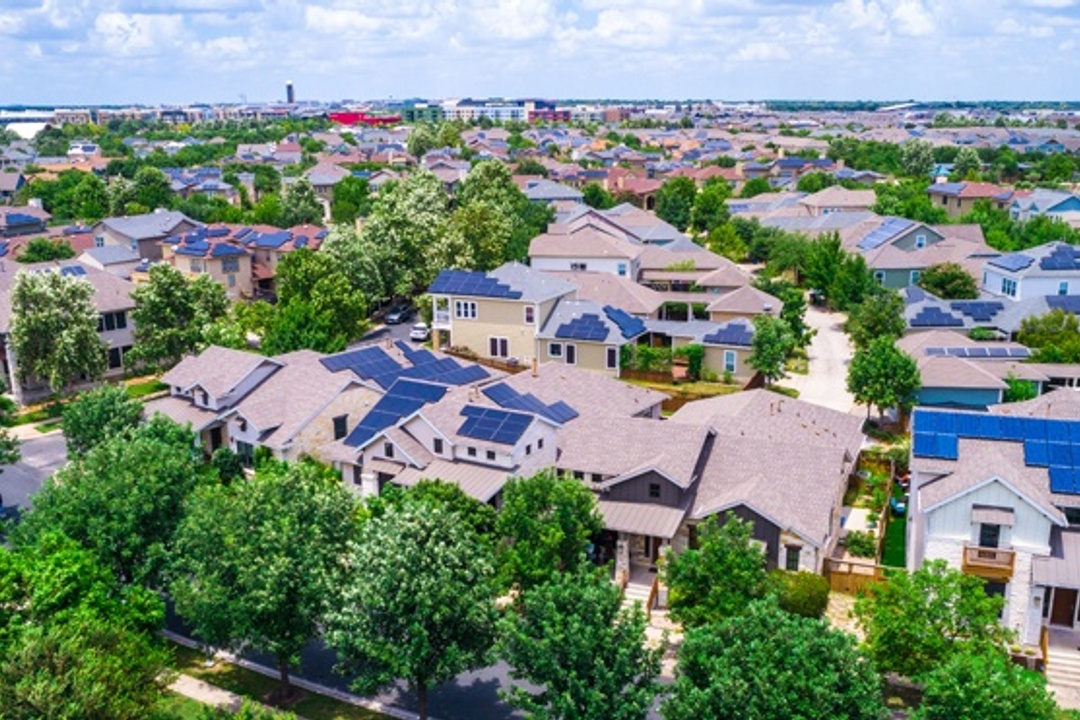
Closing costs are typically around 2-5% of the sale price of the home, although that can vary in certain situations. In Texas, your closing costs can range greatly depending on the price of your home, the deal you negotiate with your lender, and how closing costs are split between parties.
That's only an average amount because you could be paying closing costs that range lower or higher. Depending on the deal you negotiate with your mortgage lender, the final closing cost can change dramatically.
So as a borrower, you can "shop around" among as many lenders as you'd like to find the best deal.

What Are Closing Costs?
Closing costs are the collection of required fees that come with closing a mortgage. Typically, they are 2-5% of your loan amount for the home purchase and refinance loans.
These costs also include all charges by your lender, home appraiser, title company, and other third parties involved with the mortgage. It's preferable to pay all of these fees the day you're closing on a house.

Closing Costs in Texas: What You Can Expect to Pay
So how much will you pay for closing costs on an average home in Texas? Studies show that they are actually less than the national average.
According to a 2020 research study by The Ascent, the average closing cost in Texas is $3,744 for a home priced at $274,163, which is 1.37% of the home sale price. In addition, Texas doesn't have any taxes or fees on real estate transfers. So if your closing cost is $3,744, it remains the same even with taxes.
Has anything changed in 2021? Well, the average price of homes in Texas has gone down since last year. According to a study by Closingcorp, your average home price in the state is $266,667. That makes the average closing cost $3,753.65, which is 1.41% of the home sale price, with taxes included in the percentage.
However, Texas is a large state, and just because the housing market is affordable in some areas doesn’t mean it’s that way everywhere.
For example, according to the Austin Board of Realtors, as of June 2021, the median home price in Austin, Texas is $575,000. The larger your mortgage loan, the smaller the percentage you will typically have to pay. For a mortgage of $500,000, you‘re likely to pay around 2%. So, we can take $575,000 and multiply it by 0.02 (2%). This would give you a closing cost of $11,500.

How to Calculate Your Closing Costs
So how do you calculate your closing costs? It's not as daunting as you might think. All you do is multiply the price of your home by the average closing cost percentage, which is between 2-5%.
For $292,100, the median listing price of a Texas home, you'll take that price and multiply it by the closing cost percentage. Let's say you have to pay 5%, so $247,210 multiplied by 0.05 is $12,360. If you take that same listing price multiplied by 0.10 (10%) would give you a closing cost of $24,721.
Depending on what fees within the closing costs are negotiable, your payment could be drastically different. So it's essential to prepare with your expertise about these costs and how you could negotiate with your lender to lower the more flexible fees.

What’s Included in Texas Closing Costs?
Typically, the buyer and seller divide the closing costs. But because closing costs are negotiable, it's crucial to know what these costs include. As the buyer, if you want to work out a deal with the seller and have them pay a portion of your costs, knowing which costs are open for negotiation can significantly help you handle your finances.

Closing Costs and Fees for Texas Buyers
There are several closing costs and fees that affect buyers in Texas. Although the Texas market can be flexible with some of these costs, it helps to be knowledgeable about each of them to get your best deal and even save you precious time.
* Loan Origination Fees: These are charges due to the lender from the bank after the creation of a new loan. Typically, these fees are 1% of the mortgage amount. These fees are negotiable, but it depends on the risk factor of the loan and if you, the borrower, are credible.
* Appraisal Fees: These fees cover the cost of a professional appraiser to determine the home's value. Lenders usually require this fee, which ranges in price from $300-500. The price can change depending on the property type, size, and location. If your lender doesn't require this fee, it's still a good idea to have an appraiser check out the property. Having an appraiser ensures that you know the market value and don't overpay for the home.
* Discount Points: These points are prepaid interest that can reduce the interest rate charged by the bank. They are negotiable fees that the bank can cover.
* Title Insurance: This is a type of indemnity insurance that covers losses from title defects like liens, outstanding taxes, mortgages, and violations from previous owners. To ensure a property is clear of claims by other parties over unpaid dues, legal issues, and more. Title insurance varies in price depending on the price of your home, so you could pay from a few hundred dollars up to $1,000 or more.

* Recording Fees: Although not required in Texas, recording fees are expenses charged by a government agency for registering or recording the purchase or sale of real estate. Other states will charge about $0.55 for every $500 of value, but luckily, Texas doesn't impose taxes or fees on real estate transfers.
* Prepaid Costs: After a buyer gets their loan, a lender may require the buyer to pay costs such as property taxes, homeowners insurance, or rental property insurance in advance. The lender lists these costs as "The Good Faith Estimate." The buyer receives this list no more than three days after applying for a loan.
* Survey Fee: This fee pays for a surveyor to show the exact boundary, location, and legal description of the property. Depending on the size and location of the property, the fee ranges from $300-800.
* Credit Report Fee: Because your lender will pull your credit report to get you qualified for a loan, you need to pay a fee for this part of the process. The average cost per individual borrower on the loan can be $25 or more.

Closing Costs and Fees for Texas Sellers
Because the market in some areas of Texas is extremely hot, you as a buyer need to take these factors into consideration when homes are going as quickly as they have been lately. Covering your bases throughout the homebuying process will be all the more helpful in your goal of becoming a homeowner without major setbacks.
* Real Estate Agent Commission: This payment covers the cost of the real estate agent and realtor at closing. Depending on the agent, it can cost up to 6% of the sales price in Texas.
* Outstanding Amount Owed On the Property: Any unsettled payments on the home will be your responsibility. These payments include fees from the Homeowner's Association (HOA) and utility bills. These costs will be allocated to your closing day.
* Prorated Property Taxes: In Texas, property taxes are paid in arrears, meaning that you'll owe property taxes for the part of the year you have owned the house. This time could be anywhere from 30 days to 300 days, with the payments prorated based on the number of days you've owned the home.
* Settlement Fee: You can avoid attorney fees in Texas, but you need to pay this fee to the title company or escrow for providing their services on closing day.

* Title Search: Depending on the state, this fee ranges between $75-100 and looks into the history of the home's ownership to ensure that you are the valid owner. The fee also provides that the title is clear of liens and judgments.
* Municipal Lien Search: This search goes beyond the standard title search by looking into unrecorded property issues, which can include code violations, opened or expired permits, or water, sewer, and solid waste balance. The cost differs by the municipality, but it's usually between $100-200.
* HOA Estoppel: This letter informs you of how much you owe the HOA, including monthly dues, special assessments, past dues, fines, or any fees. The title company must confirm that you are in good standing with the HOA and have your dues taken care of before they can give a clear title on your house.
* Title Insurance: This insurance protects the buyer from any issues that may occur if the title has outstanding liens that went undiscovered during the title search. Although Texas sets the rates, it also depends on the price of your house. Typically, the title insurance can cost anywhere from $700-$2000. For a home priced at $274,500, you could be paying roughly $1,300 to over $2,000. While it's negotiable over who pays this fee, in Texas, the seller usually pays it.

Other Costs to Consider
That's right; there are more costs to consider when buying a home. However, it's best to know about these other costs to prepare before diving into homeownership without realizing these extra expenses.
* Property Taxes: These taxes are a part of homeownership while also funding the city, county, schools, and hospitals. Property taxes go to the taxing authorities from the mortgage's escrow account, which the mortgage servicer holds. If the escrow account doesn't exist, the property taxes come from the homeowner.
You'll pay these taxes at the end of the home loan process during the closing. Therefore, property taxes are like prepaid fees in the closing costs. To find the amount of property taxes, you multiply the home's assessed tax value by the tax rates.
* Homeowners Insurance: It's crucial to have homeowners insurance because it covers potential damage to your home. You will usually pay the first year of insurance at the time of closing. At an annual premium of $1,945, Texas is the seventh most expensive state for homeowners insurance. The amount you have to pay will vary depending on the size of your home, assets, and new address.
* Utilities and Maintenance Costs: The basic cost of utilities are low in Texas, compared to the high property taxes and homeowners insurance premiums. The price for one month of utilities that include electricity, gas, internet, cable, and water cost about $409.78 in Texas.

How to Save on Closing Costs in Texas
With the range of lower to higher closing costs you can expect in Texas, how can you save as much money as possible? You have to talk to several lenders to find the best deal they can offer, but other helpful tips to have in mind when saving money are a priority.
Lender Credits
Lender credits are an agreement with the mortgage lender to cover part or all of your closing costs. But there's a catch with this transaction: you will pay a higher interest rate.
These credits are also known as a no-closing-cost mortgage, where you can choose not to pay the closing cost, but you'll be paying more in interest on your home. In addition, this could cost you more in the long run than paying the closing cost.
Seller Concessions
When a seller covers part or all of the buyer's closing costs, this is a seller concession. However, the seller doesn't pay out of pocket: they use a portion of the profit from the house sale to cover the buyer's costs.
Seller concessions work best in a buyer's market when homeowners are planning on selling, but occasionally, the buyer has to agree to a higher purchase price. If the seller agrees, they have to pay the closing costs. But there are limits on the number of closing costs a seller can pay.
Roll Closing Costs Into the Loan
If you're refinancing your loan, you may have the option to roll closing costs into your loan balance. But keep in mind that this is only an option for refinance transactions, not purchase transactions.
When you're rolling closing costs into the loan, it means that you'll pay interest on them so that they will cost more in the end. However, if you don't plan to keep the entire loan term, your monthly savings from refinancing might be worth more than the long-term cost.
However, the loan amount will not include all closing costs. So, for instance, you will always pay property taxes and homeowners insurance upfront. The rules also vary by loan type, so on an FHA Streamline Refinance, the upfront mortgage insurance fee can be rolled into the loan balance. But other closing costs must be paid upfront.

Closing Cost Assistance
Need to save on your closing costs? Texas has a few closing cost assistance programs that could be available to you if you're eligible.
* 5 Star Texas Advantage Program (SETH): This program provides homebuyers down payment and closing cost assistance when purchasing a home. As a borrower, you will have several options and choose the amount of assistance you need and the loan option that works best for your needs.
The maximum amount provided for conventional loans is their 5% grant, and that is 5% of the total loan amount. If you're a borrower using the Freddie Mac conventional mortgage option that meets their Affordable Income Subsidy Limits may be eligible for an additional grant worth up to $2,500 of the loan amount.
* Home Star Program: This program is run under the 5 Star Texas Advantage Program (SETH) and provides up to 4% of the total loan amount in a down payment assistance grant in addition to a 30-year fixed-rate FHA, VA, USDA, or conventional mortgage loan.
You can also save more on closing costs by negotiating with sellers. For example, an experienced real estate agent can assist you in the process and potentially get you a more flexible deal when closing your new house.

Negotiation
When you're a borrower, you can speak with several mortgage lenders to find the best deal for your needs. For example, if you're looking for lower closing costs, you can easily choose the lender with the best deal out of your lineup of options. You can even take an offer and take it to another lender to see if they will match or beat it.
With enough motivation, you can get mortgage lenders to compete for your business. Want more bargaining power? Make sure you have an excellent credit score and a large down payment. These two factors will make you a "prime" borrower.
However, keep in mind that not all closing costs are negotiable. For example, the capacity of your negotiations on certain closing costs depends on your property's location. Your loan estimate will specify your options. Here's a cheat sheet of which closing costs are negotiable and non-negotiable.
* Mortgage Lender Charges: Negotiable. These charges include the origination fee, underwriting fees, processing fees, and the application fee.
* Appraisal and Credit Reporting: Non-negotiable. The closing costs for third-party services can't be negotiated with your lender. That includes appraisal charges and credit reporting fees, but you can still shop around and save on these options. For example, you can find a lower-cost closing attorney.
* Title and Escrow Fees: Negotiable, but only in some states. The title service fees show up in Section B or C of the second page in your Loan Estimate. If these fees appear in Section C, you can shop around and compare charges from several companies. In states that allow you to compare and shop, the fees and premiums can differ by thousands of dollars.
A helpful tip if you purchase lenders and owners title insurance policies from the same provider, you can ask for a simultaneous issue discount. This discount is the reduced rate of a loan or owner's policy of title insurance that's issued on the same property or loan at the same time as another policy.
When you're on the homebuying journey, take note of your options with closing costs so you know ahead of time which fees you can skip or negotiate with the seller. In addition, learning some tips and tricks can save you time and money when purchasing a home in the super-hot Texas market.
So take advantage of the helpful tips and advice to find the best deal for your Texas closing costs. Check out more articles on HomeCity for expert advice on home buying!










